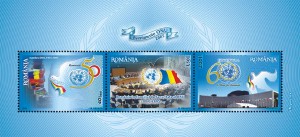 “This minister from a small country practices big-league politics. What an amazing man! In foreign policy, he is embarked on a frail little skiff, which he steers like a great ship; in domestic policy, he stands astride a rotten plank to which he ultimately gives the stability of a rock!” – wrote Édouard Herriot, Prime Minister of France, about Nicolae Titulescu, Romania’s Minister of Foreign Affairs and former representative of Romania at the sessions of the League of Nations between 1920 and 1936.
“This minister from a small country practices big-league politics. What an amazing man! In foreign policy, he is embarked on a frail little skiff, which he steers like a great ship; in domestic policy, he stands astride a rotten plank to which he ultimately gives the stability of a rock!” – wrote Édouard Herriot, Prime Minister of France, about Nicolae Titulescu, Romania’s Minister of Foreign Affairs and former representative of Romania at the sessions of the League of Nations between 1920 and 1936.
Nicolae Titulescu, regarded during the interwar period as one of the most prestigious figures in international political life, would go on to serve twice consecutively as President of the League of Nations, the forerunner of the United Nations, in 1930 and 1931.
On June 26, 1945, the Charter of San Francisco was signed by 50 states. On October 24, through the ratification of the Charter by China, France, the United Kingdom, the United States, the USSR, and the majority of other signatories, the United Nations came into being. It was established as an expression of the nations’ determination to prevent another world war, to maintain international peace and security, to foster friendly relations among states, to promote cooperation in solving economic, social, cultural, and humanitarian issues facing humanity, and to encourage respect for human rights and fundamental freedoms for all, without distinction as to race, sex, language, or religion.
Political motivations led to Romania not playing as significant a role in the refounding of the multilateral system after World War II as it did during the interwar period. Romania became a full member of the United Nations ten years after its establishment, on December 14, 1955.
In the 50 years since that event, Romania has made important contributions to the promotion of the UN’s objectives. After 1989, Romania focused its attention on areas with major impact on global peace and stability: combating terrorism, preventing the proliferation of weapons of mass destruction, promoting human rights, and participating in peacekeeping operations.
Romania was elected a non-permanent member of the UN Security Council in 1962, 1976–1977, and 1990–1991. From 2004 to the end of 2005, Romania once again held a non-permanent seat on the Security Council, consistently promoting, in the spirit of the UN Charter, diplomatic solutions to complex issues in the field of international peace and security. In October 2005, Romania held the presidency of the UN Security Council for one month—a role of great responsibility and significance on the world’s most representative stage: the United Nations.
To mark these important events, Romfilatelia, the company specialized in issuing and marketing Romanian postage stamps, is releasing the philatelic issue UN Events.
Date of issue: 2005-10-24








